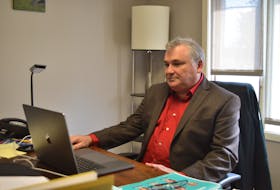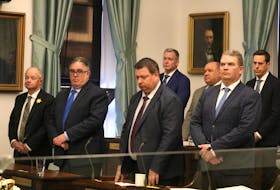WEST CAPE, P.E.I. — At this time of year, Jonathan MacLennan’s farm office is located just behind the steering wheel of a John Deere tractor.
From that location, he keeps in touch with his workers, either by CB radio, cellphone or text, and it is from there he places the orders for the fuel and fertilizer needed to keep the equipment running.
The steering wheel is secondary, as the tractor’s steering is guided via the machinery’s GPS system.
MacLennan, like growers on practically any farm nowadays, usually only has to put his tablet or cellphone down and actually touch the steering wheel when his tractor, pulling a six-row planter, arrives at the end of the field.
Planting season is about the only time during the crop year that MacLennan, co-owner of MacLennan Properties Ltd., with his wife, Katie, gets behind the wheel of a tractor. Much of his time is spent in the farm’s actual office.
He said he’s fortunate to have hard-working employees.
“I remember when my father was farming. He would notice that so-and-so wasn’t running the harvester anymore, wasn’t running the digger - the actual owner of the farm.”

Jonathan, 44, is the fifth generation MacLennan to operate the family farm.
The first three MacLennans ran mixed farming operations, including potatoes.
It was his father, the late Laurids MacLennan, who turned growing potatoes into the farm’s specialty.
Jonathan has kept up with that tradition, buying his first field when he was 18 and is now a veteran of 25 harvests.
“My job is more paperwork, office work, and human resources; making sure everybody else has a job,” he said. “That’s just the way the farm runs. I’m better off to be out of the equipment and kind of overseeing things.”
But, office or tractor, MacLennan is where he wants to be.
“There’s absolutely nothing I ever wanted to do other than farm and grow potatoes. I know, when I was younger, it didn’t really matter to me if I was doing it for myself or doing it for somebody else – I wanted to be involved in growing potatoes, running the equipment and growing crops in the field. I grew up with it, too. It’s what my father always did, so, I guess I wanted to do what he did.”
Today, MacLennan Properties grows around 700 acres per year of seed and processing potatoes on owned and rented land.
At 300 acres, this year will be their largest seed crop ever.
“What we grow is either going to be French fries this winter or next winter,” he said.
Their rotation includes barley, and, in the third year, sorghum-sudangrass or alfalfa, which is plowed in and used as a soil-builder. Much of the straw from the barley crop is traded for manure.

MacLennan’s favourite time of the farm season is the harvest.
“You get to see the work you put in over the year.”
Except for last year, as there was nothing about 2018’s harvest to get excited about.
“We work with an agronomy firm to tell us what we should be doing, with what variety. I felt, last spring, we were the most prepared for putting a crop in; different fertilizer treatments, a lot of different things like that,” MacLennan said. “I felt, with the preparations we made, we were lined up to have the best crop, and then the summer came in dry and we had the worst crop, ever.”
P.E.I. Potato Board manager Greg Donald said more than 7,000 acres of an 86,000-acre P.E.I. crop didn’t get harvested in 2018.
“There’s lots of hardship after last year,” Donald said.
As if a switch had flipped, the weather suddenly turned cold and wet just as the harvest season was about to start.
A Sept. 25, 2018 killing frost brought the growing season to an abrupt halt.
MacLennan Properties was able to get its entire crop out, but MacLennan said the yield was 25 percent below normal.
“If it wasn’t for our irrigated acres, I feel we would’ve been down over 30 per cent.”
He feels the loss would have been greater still if he hadn’t had the benefit of an agronomy firm.
The first year he used the service his farm was named Cavendish Farms’ 2013 champion grower.
“That’s my Stanley Cup,” he said.
Since then, the farm has been Top 10 three more times.
Crop growing timelines
- Seed potatoes are cut into sets in early May and kept in storage until ready to use
- Land preparation starts early to mid-May
- When the grain sowing is completed and with potato-planting still underway, a farm worker starts hilling the potato fields.
- The first spray is for weed control
- Blight control starts late June, early July
- Seed crop needs to be rogued during the summer
- Summertime repairs are carried out on harvesting equipment
- A top kill is applied, usually in two applications, in preparation for harvest
- Seed harvest starts in late September, followed immediately by the rest of the crop.
- Potatoes trucked to the processing plant during harvest and throughout the year (last of MacLennan’s warehouses from 2017 crop emptied Aug. 24, 2018).
Only 80 to 90 acres a year are irrigated on the MacLennan farm, with water supplied from a holding pond which is kept stocked with a residential well.
“There are years when it’s not needed. Those are the years I look forward to,” MacLennan said. “If we get enough rain from Mother Nature, I look forward to never having the pivot run, but I feel we’ve had enough years that our investment into the irrigation system has paid off.”
While this planting season is starting off much like the last one - cool, wet and late - MacLennan is hoping for better weather conditions going forward.
“Tomorrow’s always going to be a better day and next year is always going to be the best year ever,” he said, describing the optimism that keeps growers going.
MacLennan said his first sets went in on May 24, around the time he would normally like to be finishing.
He doesn’t expect to wrap up planting until around June 10, and that’s weather dependent.
His sets are already cut and are being kept cool and dry.
The farm employs two full-time workers, includling Cory Dumville, who is the runner, keeping the potato-planting and grain-planting crews supplied with product, and John Cahill, who currently runs the payloader.
When MacLennan gets to the loading end of the field, Cahill is there waiting with a payloader and a potato "bomb" which is capable of quickly loading the planter with potato sets and fertilizer so that MacLennan can get back to planting with less than a minute of downtime.
In planting season, every minute counts.
A tractor and harrows keep the land freshly worked ahead of the planter, while in another field, two more workers are harrowing land and sowing grain.
MacLennan, in the meantime, is able to keep in touch with all of them from his tractor office in front of the planter.
The farm crew will swell to about 16 for the harvest.








